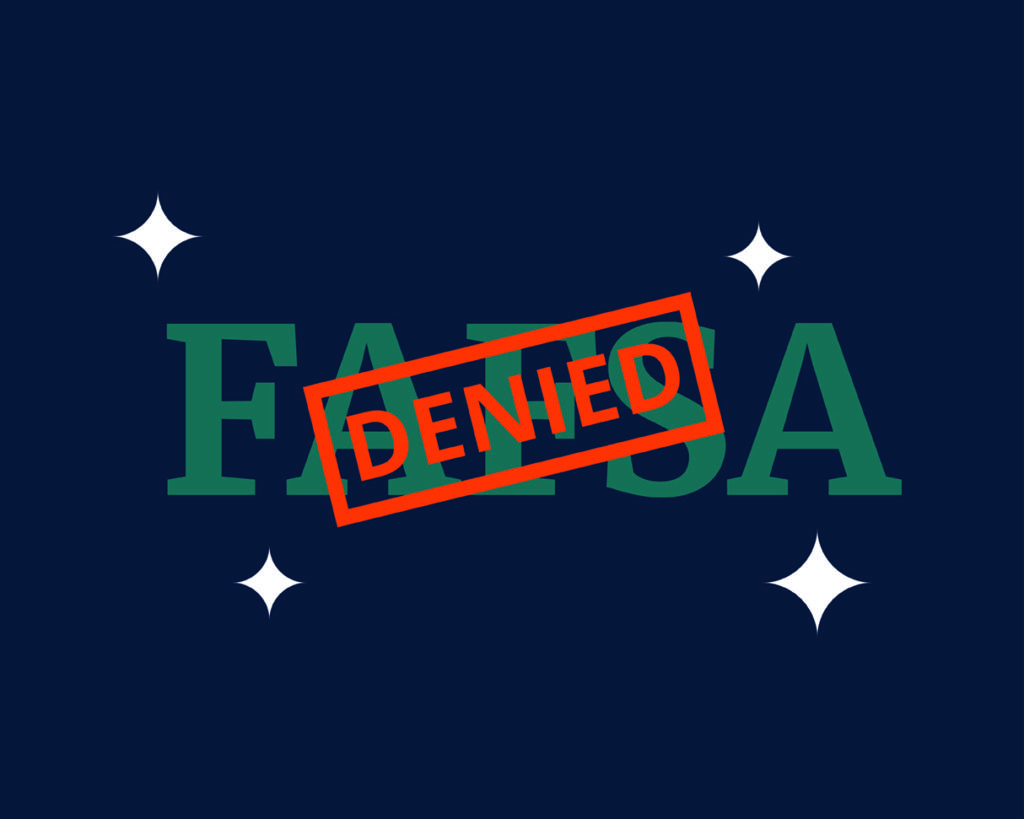Start Building Your Child’s Credit
The Free Application for Federal Student Aid (FAFSA) provides a gateway for students to access financial aid for higher education. In fact, over 85% of students in the U.S. receive some form of financial aid.
The Free Application for Federal Student Aid (FAFSA) provides a gateway for students to access financial aid for higher education. In fact, over 85% of students in the U.S. receive some form of financial aid.
When filling out the FAFSA, you need to provide information like your Social Security number (SSN) or Alien Registration number (for non-U.S. citizens), W-2s, federal income tax returns, and other records of money earned. If you falsify any of this information or provide someone else’s personal identifying information in the application, you may be charged with FAFSA fraud. We’ll explain what FAFSA fraud is, how it happens, and how to report it.
How Does FAFSA Fraud Happen?
Higher education is expensive, and many students apply for financial aid to afford college. States and the federal government invest billions of dollars each year into educational aid so that many students can benefit from the program.
Although the aid is meant to help students, it also attracts those who want to abuse the system to fraudulently get the funds and use them for other purposes. FAFSA fraud happens when someone fills out the FAFSA form with false information so they can illicitly obtain funds through the U.S. Department of Education.
Types of FAFSA Fraud

When applying for financial aid, make sure to provide accurate information on the FAFSA form to avoid being penalized for fraud. You should also take steps to protect your identity from criminals who may use your personal information, such as your SSN, to fraudulently apply for aid.
Federal student aid fraud may take the following forms:
- Underreporting income and assets
- Overstating household size
- Guardianship transfers
- Fake marriages
- Fabricating qualifications
- Identity theft
Underreporting Income and Assets
When filling out the FAFSA form, one of the requirements is reporting family income to help determine whether the applicant needs financial aid. Some people intentionally underreport income, making it lower than the actual figure so that they can receive a larger amount of aid.
Others will lie about assets or underreport any additional source of income. However, this is less common now that applicants use the IRS Data Retrieval Tool (DRT) because this tool transfers income and tax information automatically from federal income tax returns to the FAFSA.
Even if the applicant doesn’t use the IRS DRT, they can still get caught underreporting income because many colleges will require them to submit documents like the:
- IRS tax return transcript
- IRS tax account transcript
- IRS verification of non-filing letter
Overstating Household Size
An applicant from a large household that has more children enrolled in college will typically qualify for higher financial aid. The Expected Family Contribution (EFC) measures the family’s financial strength based on their assets and income and then divides it by the number of children in college during the award year.
Since all this information is obtained from the FAFSA form, stating a higher number of children on the application will mean dividing the parent’s income by more children than there are in reality. Some applicants may even count pets in the household size, while wealthier families sometimes count nannies and cleaning staff as family members so that they can qualify for more financial aid.
Guardianship Transfers
Student aid is meant to help students who truly need it based on their family’s income and assets. A student from a wealthy family should receive a much lower amount of financial aid than students from low-income families. However, some parents may transfer legal guardianship of their college children to a friend or relative with low income to qualify them for more financial aid as independent students.
FAFSA doesn’t require independent students to fill in parent information. This means no income or assets will be reported, so students from wealthier families could be treated the same as low-income applicants. This type of fraud denies deserving children an opportunity to benefit from need-based grants.
Fake Marriages
When a student gets married, they’re considered independent and should report their spouse’s income and assets on the FAFSA instead of their parents’. This can sometimes make the student more eligible for need-based financial aid.
The assessment rate for income and asset conversion rates for the student will be similar to that of dependent students, which are higher compared to rates that apply for parents’ income and assets. Parents’ income is also sheltered through tax allowances and income protection allowances, but if the spouse’s income and assets are lower than the parents’, this may lead to a lower EFC.
Fabricating Qualifications
To qualify for federal aid, students must meet several criteria to prove that they’re eligible, such as:
- Being enrolled or accepted as a regular student in an eligible degree or certificate program
- Being a U.S. citizen or an eligible non-U.S. citizen
- Demonstrating a financial need for need-based federal student aid programs
Applicants also have to attain certain scores on assessment exams to qualify for grants. Some applicants may manipulate their assessment scores so that they can qualify for grants. Sometimes, they may purchase fake documents, such as a diploma or transcript, and include these in their application form.
Identity Theft
Criminals may steal others’ names, SSNs, and dates of birth and use them to apply for financial aid. In most cases, they’ll create multiple identities and submit dozens of fake FAFSA applications, hoping that most of them will be successful.
This financial aid fraud is most common at low-cost colleges because the tuition fee is lower, so the amount of financial aid that’s left after paying the tuition fee is higher compared to that of high-cost colleges.
What Are the Warning Signs of FAFSA Fraud?

Detecting FAFSA fraud early can reduce its impact and ensure that only deserving students benefit from federal financial aid. Here are some warning signs that may point to FAFSA fraud:
- Interest and dividend income reading zero or low compared to the family’s wages
- No alimony payments are reported if parents are divorced
- No business or farm income is reported for self-employed parents
- Round numbers like $0, $500, and $1,000 appear for income
- The tax return doesn’t appear genuine
- Several registrations from similar locations out of state
- Large financial aid refunds or disbursements
- The same emergency contact for multiple applicants
How To Report FAFSA Fraud Anonymously
If you have evidence of potential FAFSA fraud cases and want to report it anonymously, you can reach out to the following agencies:
- Financial aid administrator at the student’s college
- The Office of the Inspector General (OIG) at the U.S. Department of Education at 1-800-MIS-USED (1-800-647-8733) or an online complaint
- Federal Trade Commission (FTC)
- Consumer Financial Protection Bureau (CFPB)
- The federal student aid feedback system
- If the FAFSA fraud involves identity theft, report it through IdentityTheft.gov
Tips for Preventing FAFSA Fraud
You should be aware of the countless scammers waiting to take advantage of the process when you’re applying for financial aid. Avoid paying someone to assist you in filling out the FAFSA, even if you find it overwhelming. If you need any help filling it out, consult a financial aid counselor at your school of interest.
FAFSA identity theft is a serious crime, and having your identity stolen this way can impact your finances, cause academic disruption, damage your credit, and even lead to legal issues. Here are some steps you can take to protect yourself:
- Make sure you’re on the right website—Only access the FAFSA form through the official site (FAFSA.gov)
- Be cautious about sharing your information—Never share your FSA ID or personal identification information with anyone you don’t fully trust
- Create strong passwords—Use strong and unique passwords for your FAFSA account
- Invest in an identity theft protection service—Consider subscribing to identity protection services like FreeKick, which will monitor your sensitive information and prevent possible ID fraud
Build Credit and Protect Your Identity With FreeKick
For a successful FAFSA application, you need a secure identity and a good credit profile. A good credit profile shows you’re good at handling finances and increases your chances of obtaining student loans, while a secure identity helps you clear FAFSA verification. FreeKick by Austin Capital Bank is an FDIC-insured deposit account that helps you both build credit and protect your identity.
Building Good Credit With FreeKick
You’re eligible for FreeKick’s credit building service if you’re between the ages of 13 and 25. This is a great way to establish a credit history early on in life, and there are only three simple steps involved:
- Create an Account—With your parents’ help, create an account at FreeKick.bank and choose a deposit that suits their budget
- Set It and Forget It—Once your parents activate the account, FreeKick will start building 12 months’ worth of credit history for you
- Keep Growing—After 12 months, your parents can close the account without any fees or continue building credit for you for another year
As a result of establishing your credit profile early, you’ll get a head start of up to five years of credit history when you turn 18, which will help you save $200,000 during your lifetime.
Securing Your Identity With FreeKick
Child identity theft happens every 30 seconds, and if you fall victim to it, your FAFSA application will suffer. You might also get charged with crimes like credit card theft, so it’s good advice for your parents to invest in protecting your identity. FreeKick’s ID protection services include:
| Services for Minors | Services for Adult Children and Parents |
| Credit profile monitoring Social Security number (SSN) monitoring Dark web monitoring for children’s personal information Up to $1 million identity theft insurance Full-service white-glove concierge credit restoration Sex offender monitoring—based on sponsor parent’s address | Credit profile monitoring SSN monitoring Dark web monitoring for personal information Up to $1 million identity theft insurance Full-service white-glove concierge credit restoration Lost wallet protection Court records monitoring Change of address monitoring Non-credit (Payday) loan monitoring Free FICO® Score monthly FICO® Score factors Experian credit report monthly |
FreeKick Pricing
FreeKick has two pricing plans:
| FDIC-Insured Deposit | Annual Fee |
| $3,000 | $0 (Free) |
| No deposit | $149 |
Each plan offers:
- Credit building for six children aged 13 to 25
- Identity protection for two parents and six children aged 0 to 25
Take the first step toward a successful FAFSA application—sign up for FreeKick today.

Freekick provides a double dose of financial empowerment and security for your whole family. It helps teens and young adults build strong credit profiles and offers identity motoring for up to two adult parents and six children under 25.





